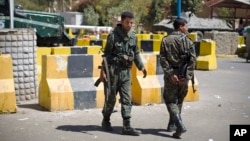The political instability in Yemen, where Houthi Shiite rebels are moving to finalize their takeover, has forced the U.S. to reassess how to implement its diplomatic and counterterrorism strategies in the country.
Deteriorating security conditions prompted the U.S. to close its embassy this week. Britain and France have announced similar closures.
The U.S. gradually began reducing its embassy staff in Yemen after Houthi rebels took over President Abd Rabbuh Mansour Hadi’s residence last month, prompting him to resign.
The State Department said the remaining staff members departed on an Omani plane and would return to Washington. Spokeswoman Jen Psaki said it was unclear when they would return to Yemen.
“I think we are pretty clear-eyed about how challenging the circumstances are on the ground and the fact that there is a great deal of work that needs to be done to return to a more stable environment,” said Psaki.
Some Yemenis fearful
The departure of the U.S. Embassy personnel has left some Yemenis feeling more vulnerable, said Farea al-Muslimi, a Carnegie Middle East Center researcher who is working in Yemen. He said there was a great deal of fear because Houthis had destroyed the “very thin line of national peace” and cohesion in Yemen.
The unrest has also affected U.S. efforts to work with the Yemeni government to fight al-Qaida in the Arabian Peninsula, said retired Rear Admiral John Kirby, the Pentagon spokesman.
“There is no question as a result of the political stability in Yemen that our counterterrorism capabilities have been affected,” he said.
However, remaining U.S. personnel in Yemen have been conducting training operations with Yemeni military forces, said Army Colonel Steve Warren. The U.S. has also retained the capability to conduct counterterrorism operations if required, he said.
Although there is a continued U.S. military presence in Yemen, it would be difficult for the U.S. to develop the same relationship with Yemen’s current leadership that it had with Hadi, said the Middle East Institute’s Roby Barrett.
“The people that now are in control of Sanaa don’t like us very much," he said. "We bet on Hadi, who is a southerner, who is a Sunni, who had no support in the north.”
Barrett said the Houthi takeover is part of a movement of northern tribes in Yemen to reassert themselves.
Houthi-Iran link
Adam Ereli, a Middle East analyst and a former U.S. ambassador to Bahrain, said the Houthis have been getting outside help with their power grab. There is a direct link between the Houthi leadership and Iran, he said.
"I think this is a very calculated move that is part of a long-term strategy of Iran,” Ereli said. “They have cultivated the Houthis.”
As the situation continues to unfold, the State Department said the U.S. would remain “firmly committed” to supporting Yemenis who are working toward a peaceful, prosperous and unified country.
The State Department said the U.S. would explore options for returning to Sanaa when the situation on the ground improved.




